Original Author: Ponyo, Xangle
Compiled by: Zen, PANews
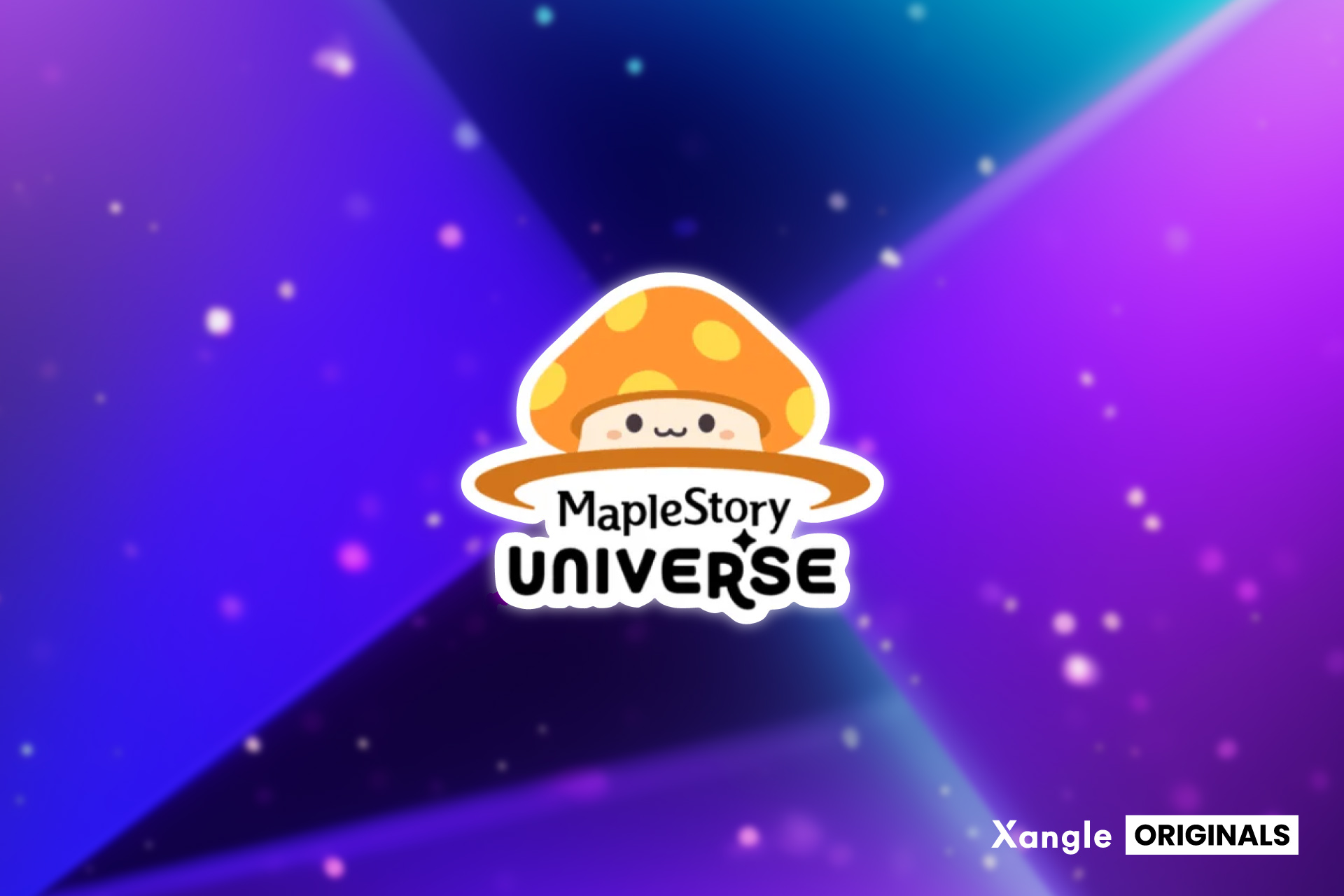
In the 1990s, Nexon led the online gaming revolution in South Korea with the first online game "The Kingdom of the Winds," at a time when the gaming industry was mainly dominated by single-player CD games. In 2000, Nexon established the free-to-play (F2P) model, which forms the basis of today's online game revenue model, and acquired South Korea's largest game IPs "MapleStory" and "Dungeon Fighter." It can be said that Nexon has always been at the forefront of major changes in the gaming industry.
Recently, Nexon announced the development of an important blockchain game using its largest IP "MapleStory." What potential do they see in blockchain games? This report aims to explore the specific value that blockchain technology brings to the gaming industry.
Nexon Continues to Grow, but There Are Still Some Concerns About Sustainability and Scalability
29 Years of Growth Trajectory Achieved by Understanding Gaming Industry Trends
Since its establishment in 1994, Nexon has overcome numerous challenges and continued to achieve remarkable growth. Over the past decade, Nexon has achieved a compound annual growth rate (CAGR) of 12.5%, increasing its revenue from 940 billion Korean won in 2012 to 3.5 trillion Korean won in 2022. To better understand, in 2022, the revenues of Netmarble, NCSoft, and Krafton were 2.7 trillion, 2.5 trillion, and 1.8 trillion Korean won, respectively (77%, 71%, and 51% of Nexon's revenue).
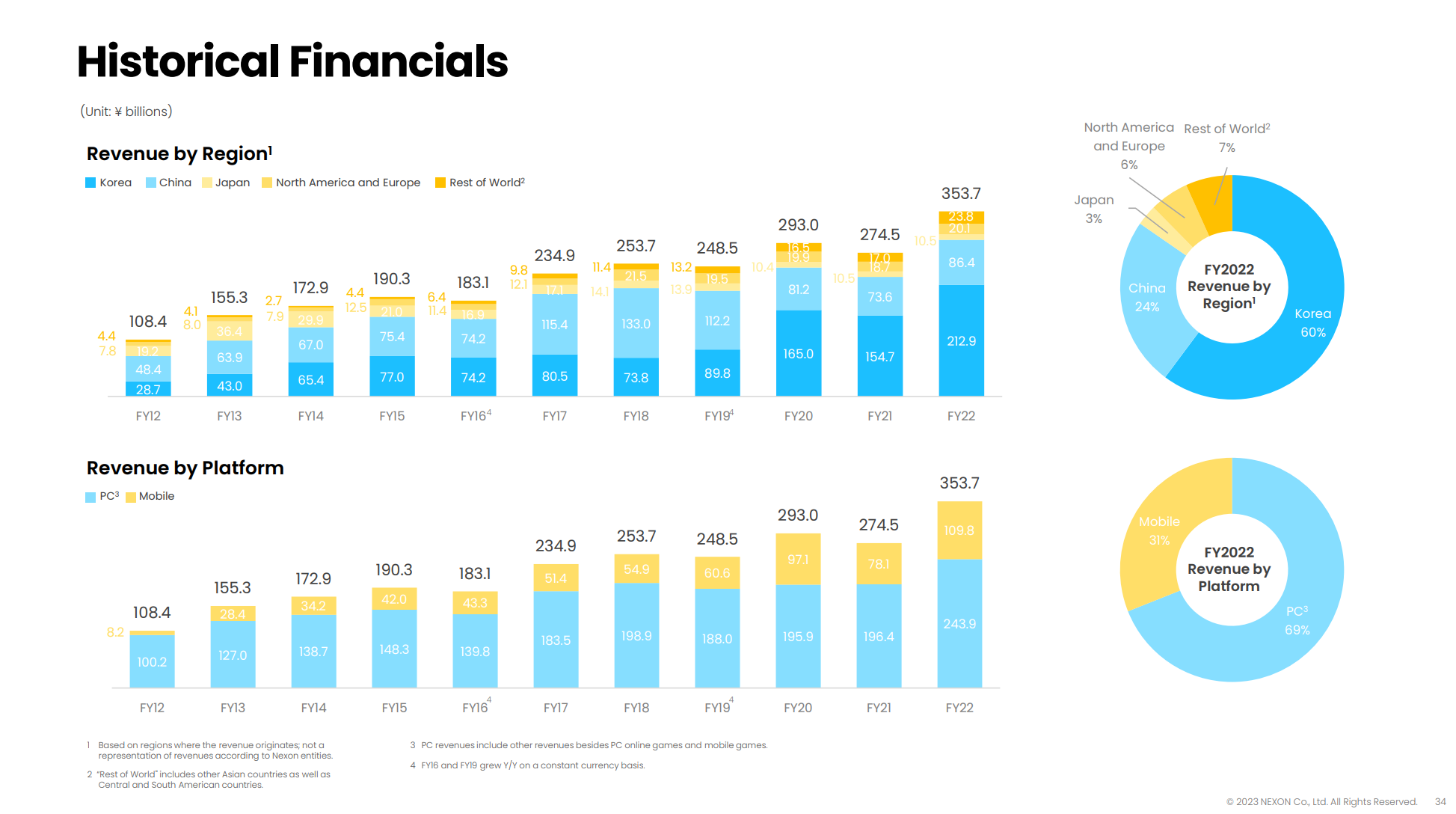
As of 2022, Nexon's revenue by region is 60% from South Korea, 24% from China, 3% from Japan, 6% from North America and Europe, and 7% from other regions. Different games have been the key drivers of growth in different regions.
In South Korea, it's "MapleStory" and "FC Online"; in China, it's "Dungeon Fighter"; in Japan, it's "Blue Archive"; and in North America, Europe, and other regions, the newly released "Dave the Diver" in June contributed to revenue growth.
In the past five years, Nexon's mobile game revenue has grown from 475 billion Korean won to 950 billion Korean won, accounting for approximately 31% of total revenue. Considering Nexon's relatively cautious attitude towards entering the mobile market during the mobile game boom in 2013 to 2014, this growth is even more remarkable. Nexon's main mobile game lineup includes "FC Online Mobile," "MapleStory M," "HIT2," "Dungeon Fighter M," "Dave the Diver," and "The Kingdom of the Winds: Yeon."
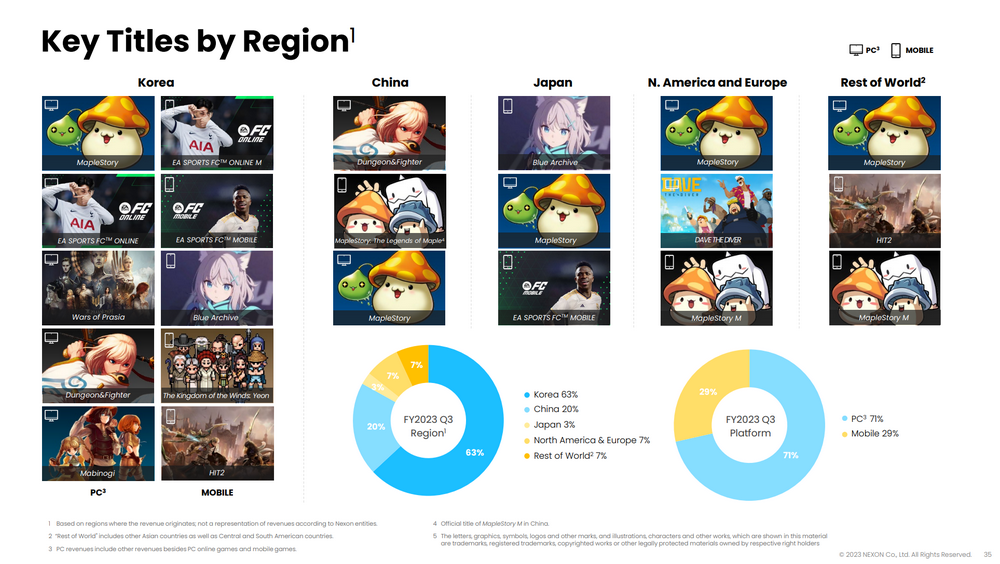
Nexon's sustained growth can be attributed to its innovation and the ability to launch popular games, as well as actively acquiring IPs with high potential. In 1996, Nexon released South Korea's first online game "The Kingdom of the Winds," which completely changed the gaming industry and solidified its position in the South Korean gaming market. After the subscription model QuizQuiz (Qplay) failed in 2000, Nexon introduced the first free-to-play (F2P) model, leading to the creation of Crazy Arcade: BnB and KartRider. In 2001, Nexon launched "Mabinogi," the first large-scale multiplayer online role-playing game (MMORPG) to use cartoon rendering technology.
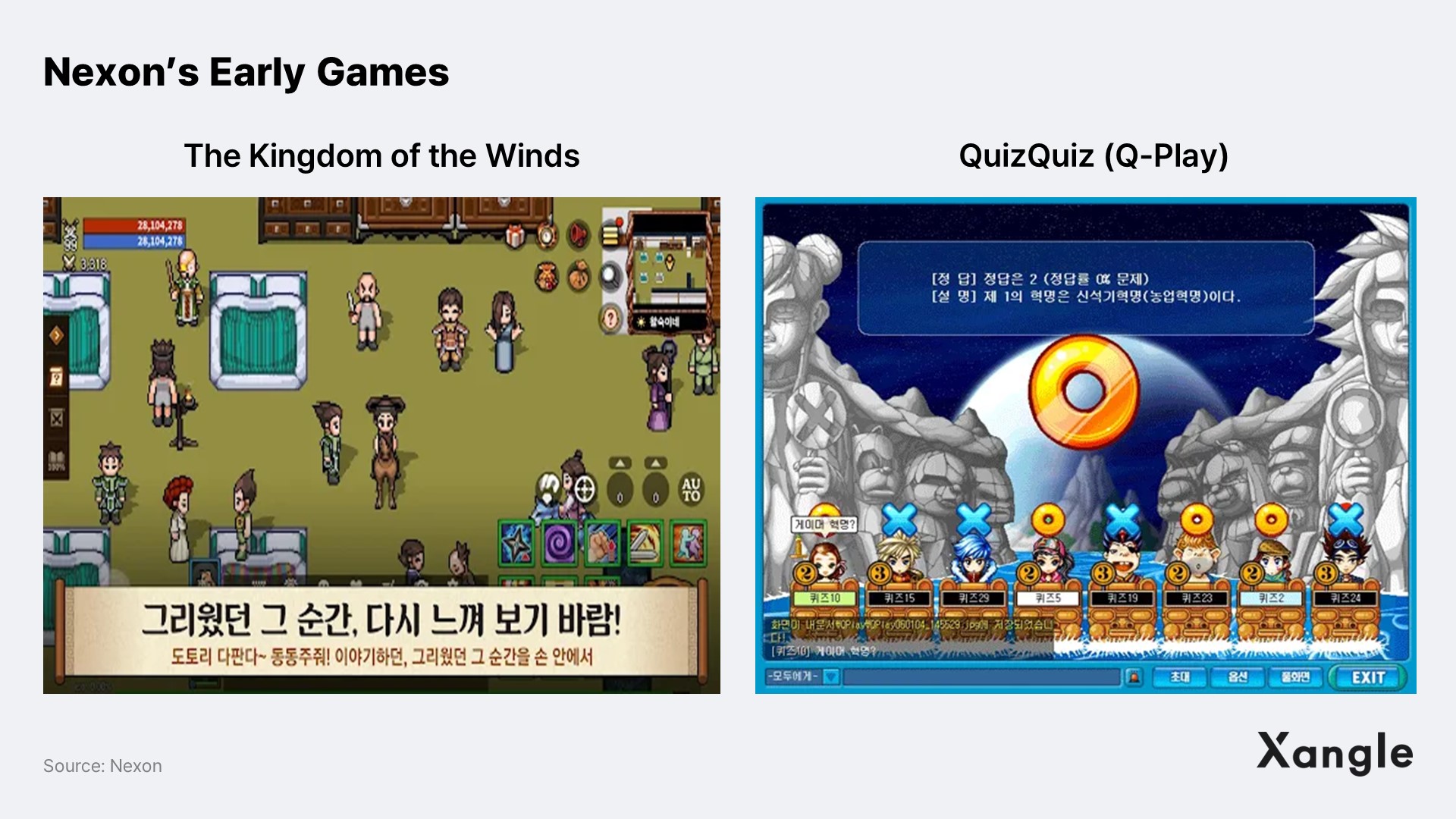
In 2004, Nexon invested all of its cash reserves to acquire Wizet's "MapleStory" for 40 billion Korean won. This bet has been hugely successful, with "MapleStory" alone generating over $5 billion in revenue to date (as of 2022) and continuously setting new revenue records in South Korea. Similarly, before obtaining a license in China in 2008, Nexon acquired "Dungeon Fighter" from Neople for 300 billion Korean won. "Dungeon Fighter" has achieved tremendous success in China, with cumulative revenue exceeding $22 billion as of 2022.
Successful Operation Based on Live Service and the "Size" Strategy
Several important IPs owned by Nexon are not only evergreen but also their cash cows. "MapleStory," after 20 years since its launch, remains Nexon's core game and has achieved the highest revenue in history. "Dungeon Fighter," "Sudden Attack," "FC Online," and "KartRider" also have enduring support from loyal fan bases, and the diversity of these IPs across multiple game genres is also noteworthy. Nexon plans to continue stable operation of these core Live Service games to achieve sustained growth. (Live Service games, or LSG, are games designed to keep players immersed in the game for as long as possible. They repeatedly attract players back to the game and encourage them to pay for microtransactions through the introduction of subsequent downloadable content (DLC), new game modes, and other new content.)
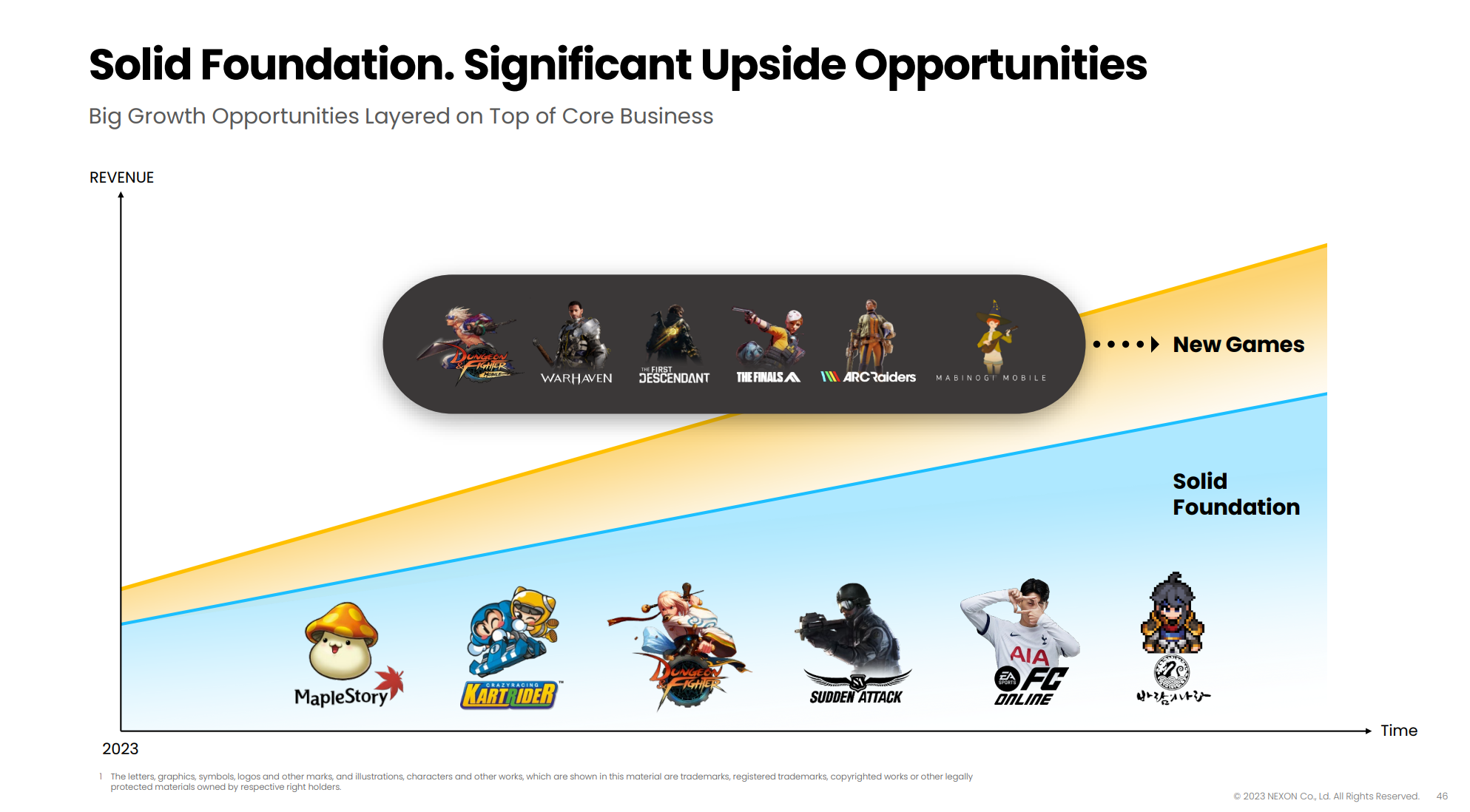
So, what allows Nexon to stably operate these Live Service games for such a long time? The answer lies in a deep understanding of the community. While there are many advantages of Nexon worth mentioning, such as excellent IPs, development capabilities, and extensive service operations experience, the fundamental reason for developing these capabilities is Nexon's deep understanding of its community.
Nexon sees its community as the cornerstone of IPs and network effects. The company views games as community services and has accordingly made investments. Nexon's focus is not only on integrating user feedback and creating new game content, but also on holding exhibitions for major updates, setting up temporary stores with IP merchandise, and hosting symphony concerts featuring game BGM, all of which demonstrate their commitment to managing the user ecosystem. Similarly, developing games in a way that aligns with user preferences and needs, based on a deep understanding of the community, is also seen as a key factor in Nexon's long-lasting success.
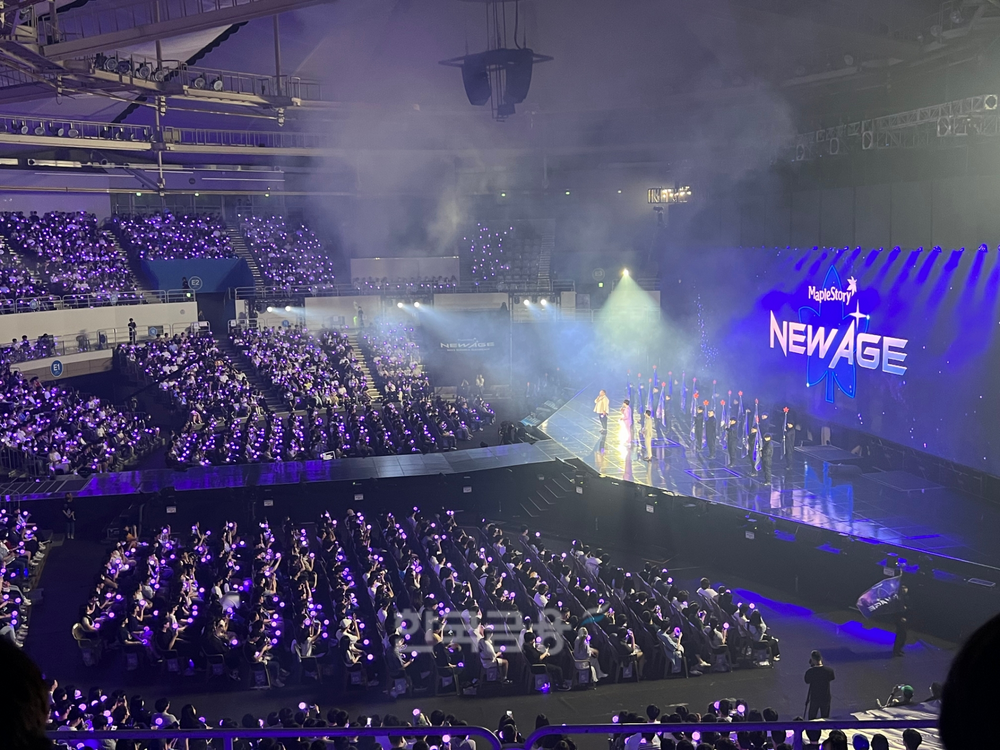
Another factor contributing to success is the excellent Reward Experience (RX). Nexon defines the core of RX as the stimulation of obtaining items. In other words, the success of the game depends on the excitement and stimulation felt during the process of overcoming numerous challenges, achieving goals, and obtaining rewards.
Nexon has successfully managed the use and rarity of items to provide a rich reward experience. The diversity of item usage depends on the variety of items, ultimately related to the quantity of content. Over the 20 years of managing MapleStory, Nexon has continuously updated a large number of professions, boss monsters, six continents, and over 60 regions, expanding the world of item usage. Hundreds of developers have created a large amount of content over the 20 years and continue to work on expanding the content. In terms of rarity, Nexon skillfully manages item drop rates and enhancement systems.
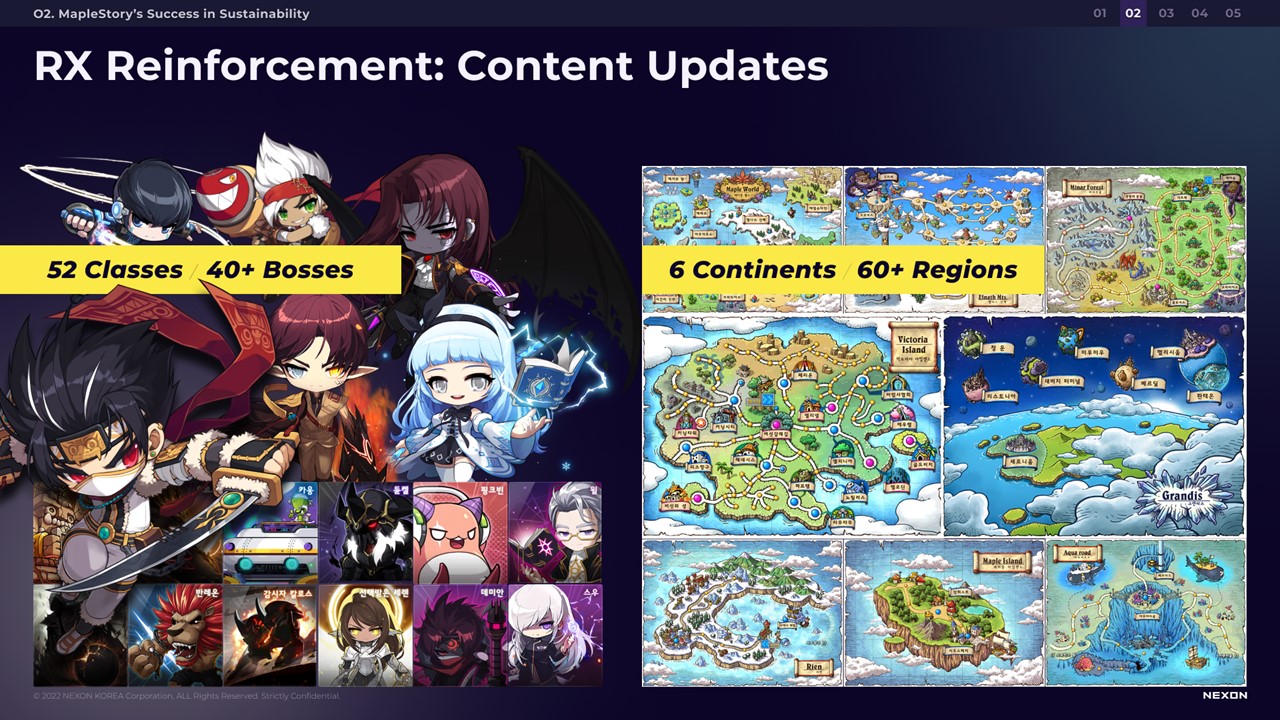
In addition, in new game development, Nexon divides its strategy into leading the market with large-scale "big" projects and focusing on creativity with innovative "small" projects, thus establishing a diversified channel for sustained growth. Projects from the fourth quarter of 2023 to the fourth quarter of 2024 include "The Finals," "ARC Raiders," "Warhaven," "Dungeon Fighter Mobile," and "Mabinogi Mobile." Among them, "The Finals" is considered the most anticipated game next year, with 260,000 simultaneous online users and a total of 7.5 million connections during its open testing period.
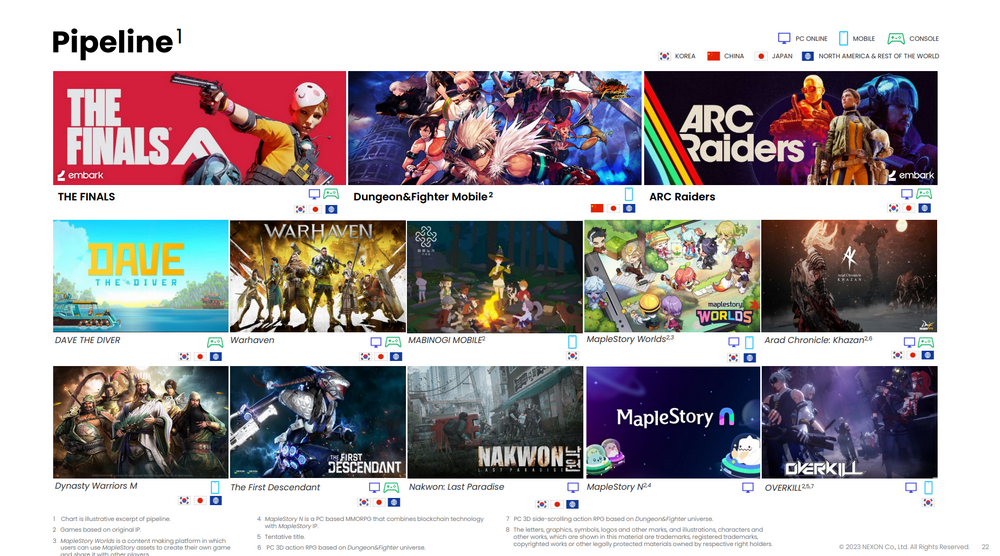
Sustainability Challenges Stem from Structural Limitations of Existing Business Models
Despite significant growth, Nexon still faces ongoing challenges, particularly in terms of scalability. Over the past 29 years, Nexon has successfully managed core Live Service and launched successful new games based on a unique understanding of community dynamics, establishing a strong ecosystem. However, ensuring sustainability for the next 30 years requires overcoming structural challenges inherent in the traditional gaming industry.
One important issue is the limitation of content diversity. In the past, games mainly consumed content provided by developers, while modern games require constantly providing new content to players. Despite efforts to add fresh content, the pace of content creation inevitably lags behind the pace of consumption. Even the most capable companies can only produce content at a speed limited by their own development capabilities, while the pace of content consumption by players exceeds the control of game developers. This phenomenon is particularly evident in South Korea. A notable example is a South Korean player completing the normal difficulty of "Diablo 3" within 6 hours of the server launch, while Blizzard had previously stated that it would take about six months.
The second challenge is the limitation of community engagement. As mentioned earlier, the community is a key factor in determining the fate of games. While Nexon is known for its deep understanding of community dynamics, directly managing or more deeply engaging with the community remains a challenge, as it is for other game developers. The structural limitations of the traditional gaming industry restrict the formal encouragement of community activities by game companies, and the risk of copyright infringement in such activities has always existed (as game IPs are owned by the companies, users do not have actual control over them). Finally, there are limitations in expanding customer loyalty, as traditional games lack mechanisms to build loyalty and connections with users through services.
Seeking Solutions Through Blockchain
MapleStory Universe: Nexon's Major IP Project in the Blockchain Game Market
Nexon has decided to use blockchain technology to address these issues and ensure sustainability. The company's first blockchain service plan is MapleStory Universe. As Nexon's flagship IP, "MapleStory" has accumulated 180 million users and generated over 50 trillion Korean won in revenue. The decision to enter the blockchain with the most important IP indicates Nexon's high assessment of the potential of blockchain. This is not Nexon's first attempt to use the MapleStory IP to launch a new game. In 2015, Nexon released "MapleStory 2," a 3D MMORPG, and in September 2022, "MapleStory World" was launched.
The highlight of "MapleStory World" is that it created a platform for individuals to create, share, and immerse themselves in unique worlds (content) using MapleStory and other IPs. Those who create these worlds have the opportunity to earn a portion of their income from user purchases. Although there are no specific numbers, the revenue-sharing model is expected to be similar to Roblox developers (see the image below).
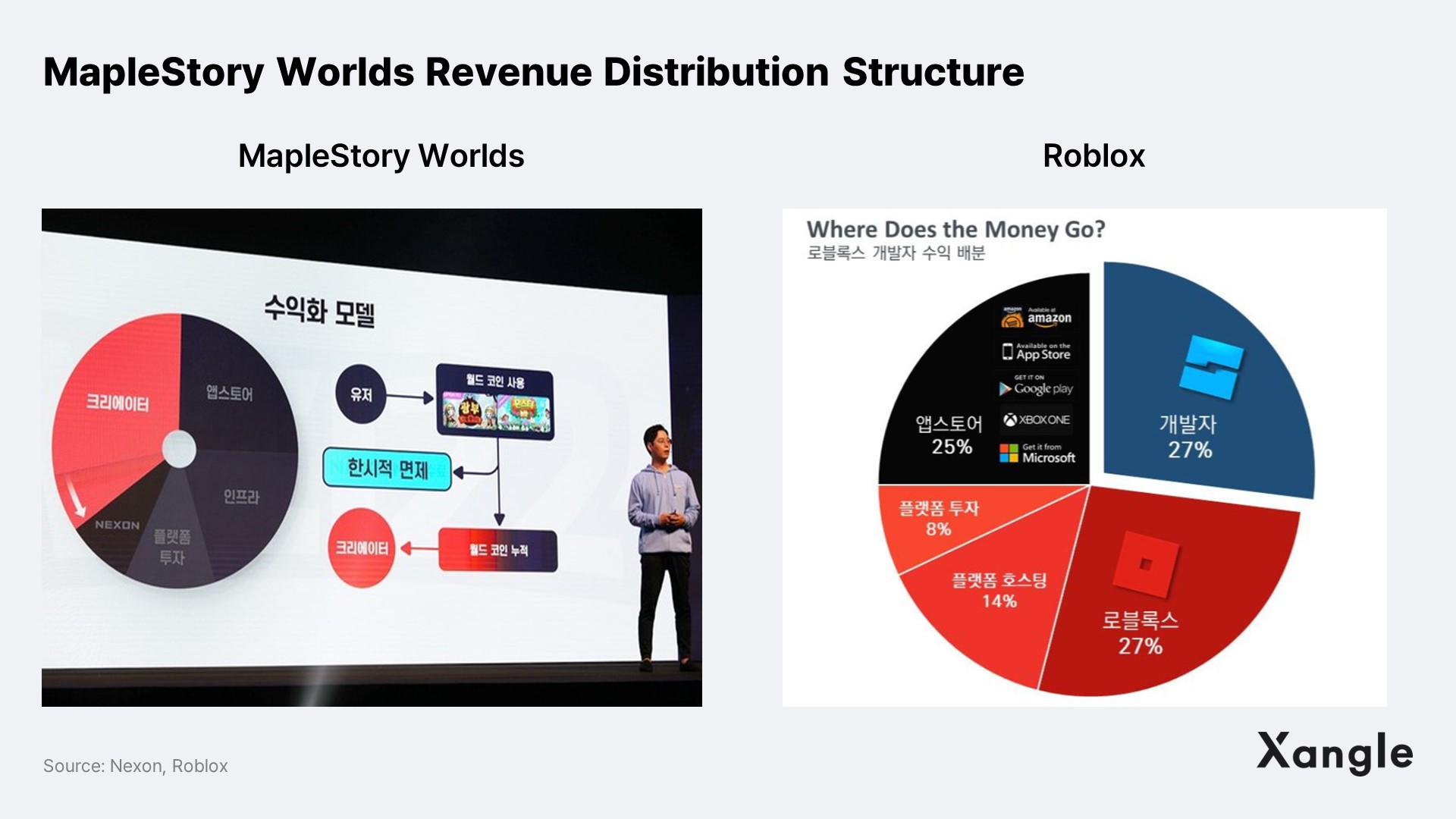
However, both of these services are currently struggling with unfavorable user reviews. Although "MapleStory Worlds" had tens of thousands of users join on the day of its release, its user base gradually decreased, with only 800 daily active users as of February this year. Additionally, "MapleStory 2" faced commercial setbacks and was announced to be shut down on June 7, 2024. Therefore, after careful consideration, Nexon turned to Web3 to seek potential solutions, ultimately leading to the development of "MapleStory Universe."
Ensuring Sustainability Through Maximizing User Reward Experience with UGC and MOD
Dae-hyun Kang, recently appointed as Co-CEO of Nexon Korea, has identified key elements of sustainability, including continuous content creation, controlling commodity inflation, nurturing intrinsic gameplay, and forming a derivative ecosystem. To meet these standards, MapleStory Universe drives user-generated content (UGC) and mod (MOD) game creation by empowering users and providing rewards. This strategy aims to cultivate a community-centered, voluntarily derivative ecosystem to maximize user reward experience (RX). The ultimate goal of the MapleStory Universe project is to establish an ecosystem co-created by the community, breaking away from the model of game companies unilaterally providing content.
In summary, MapleStory Universe is the Web3 version of MapleStory Worlds. However, MapleStory Universe integrates blockchain technology and provides a more favorable structure in terms of freedom of creation, sustainability, and scalability compared to MapleStory Worlds. To facilitate understanding, the main features of MapleStory Universe are outlined below.
*UGC represents content (maps) created directly by external creators using development tools provided by game companies, similar to custom maps in StarCraft/Warcraft or building structures seen in Roblox/Minecraft.
Feature 1: Driving a UGC ecosystem through open IP and development toolkits, promoting fair collaboration between Nexon and the community
MapleStory Universe essentially retains the look, feel, and gameplay of the existing MapleStory. However, the difference lies in empowering users and creators to utilize the MapleStory IP to create game content, including items and DApps. Users and creators are rewarded based on the consumption of generated content, and the virtual world transcends the boundaries of the game, promoting the integration of the ecosystem. In MapleStory Universe, users play a dual role as content consumers and producers (studios), expanding their involvement. From this perspective, Nexon's goal is to achieve a transformation beyond the traditional role of a game company, aspiring to become a content distributor and publisher.
So far, it is similar to MapleStory Worlds. However, MapleStory Universe goes further by fully opening its IP, allowing creators to freely develop content, including items, DApps, and other derivative creations. Essentially, users are now free from concerns about copyright infringement, can actively participate in creative activities, and have the potential to produce many innovative works. Additionally, Nexon's goal is to fairly distribute the income generated by created content to incentivize creators' activities. Nexon's own rewards will be based on contributions to fair cooperation with the community, representing a fundamentally different approach compared to traditional UGC-based games like Roblox and Minecraft, where only a portion of the revenue is shared with creators (see section 3-1 chart). However, as of now, the specific details of the FT/NFT token economics and exact reward distribution structure have not been disclosed.
On the other hand, if Nexon relies solely on external creators for content creation without providing content from the start, the possibility for users to enter the ecosystem is almost non-existent. Therefore, Nexon plans to initially launch MapleStory N as the foundation service for MapleStory Universe to ensure there is enough content for users to enjoy. However, Seon-young Hwang, the project manager responsible for MapleStory Universe, expressed a desire for the Universe ecosystem to revolve around UGC rather than just MapleStory N, emphasizing Nexon's primary task of nurturing a derivative ecosystem and fostering community growth.
Feature 2: Ensuring Transparency through Public Disclosure of Reward Processes
MapleStory Universe utilizes public blockchain technology to issue and manage commodities, providing transparent access to token (FT, NFT) and item reward data. Therefore, users have the potential to observe various on-chain data in real-time, including in-game transaction details, item distribution statistics, and income distribution for specific creators. Throughout this process, Nexon not only fosters trust among users but also anticipates the flourishing development of third-party forums, data analysis tools, and information stations centered around on-chain game data. This phenomenon is similar to third-party tools in games like EVE Online (for example, the EVE-SCOUT forum shown in the screenshot below is a real-time wormhole status analysis station created by external parties and operates entirely on donations).
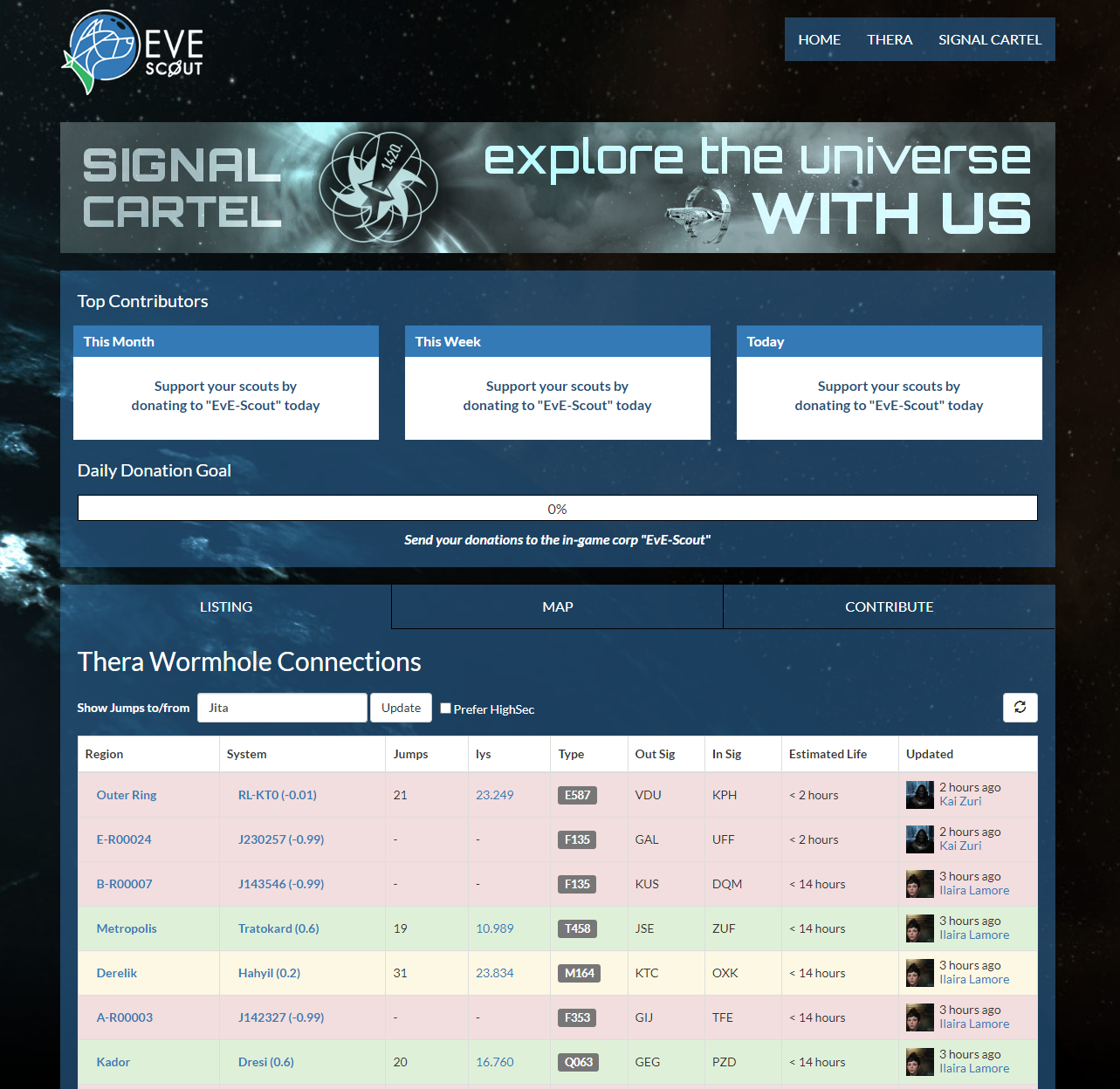
Feature 3: Establishing an Interconnected Ecosystem for Shared Economy
Popular games like MapleStory typically give rise to derivative ecosystems driven by community contributions, extending beyond the scope of existing services. This includes forums where players share game experiences, strategies, and information, as well as various information stations created through open APIs. Users perceive all of this content as part of the MapleStory experience. However, the inherent nature of the traditional gaming industry poses a challenge to seamlessly integrate existing services and derivative ecosystems. For example, in MapleStory, items cannot transcend the boundaries of the game into derivative ecosystems, limiting the RX (reward experience) of MapleStory within existing services.
However, the emergence of NFTs and tokenized data has transformed previously impossible data "on-chain" into a possibility. With tokenized data like NFTs, users can now own and trade data (items) through a trusted network. MapleStory Universe utilizes blockchain technology, allowing users to extend in-game assets beyond the game and circulate them in all derivative ecosystems, creating a shared economy.
The advantage of this structure is a significant increase in use cases, potentially greatly enhancing the RX (reward experience) of the game. Conversely, the shared economy structure suggests that heavy gamers with a large number of high-value items can freely navigate the derivative ecosystem, potentially easily overpowering new players entering the game. If this phenomenon intensifies, there is concern that the shared economy structure may disrupt the ecological balance, transforming the game into an environment focused on experienced players.
Feature 4: Strengthening Reward Experience (RX) and Managing In-Game Item Inflation through Limited NFT Issuance
Online games face endless challenges of item generation, driven by two factors: 1) the number of users and their evolving gameplay styles over time, and 2) the complexity of accurately predicting currency inflation due to dynamic player populations. Over time, the number of items is expected to continuously increase, making it almost impossible to accurately predict inflation. Essentially, traditional game systems inherently struggle to address inflation issues, and MapleStory is no exception.
To address this issue, Nexon chooses to implement a structure that limits currency production using NFTs. Specifically, items in MapleStory Universe have a total limit across the entire server, independent of the number of players, and are generated at fixed intervals in a certain quantity. For example, if Item A is limited to only 100 units across the entire server, players can only obtain 2 units per week, regardless of whether 2 or 100 players defeat monsters, only 2 units of Item A will drop that week. If no one defeats monsters that week, the reward accumulates, providing an opportunity for the next week's monster slayers to obtain 4 units. After 50 weeks, all 100 units of Item A will have been produced and will no longer spawn in the wild. At this point, users can only obtain Item A through peer-to-peer trading.
By precisely limiting the quantity of items in this way, the user experience will undergo a substantial transformation compared to traditional games. Item acquisition will no longer be solely based on individual efforts; instead, players will compete for popular items. In response, users may devise novel strategies, adding new layers of fun to the game. Users will encounter moments where they must decide whether to pursue sought-after and competitive items or prioritize the stability of obtaining items in remote areas. While requiring these new strategies and calculations, users will enjoy the excitement of successful looting, enhancing the reward experience (RX) in a unique form of fun exclusive to MapleStory Universe. Additionally, by managing the total quantity of items in this way and maintaining scarcity within a stable range, the related challenges of previous inflation issues can also be effectively addressed.
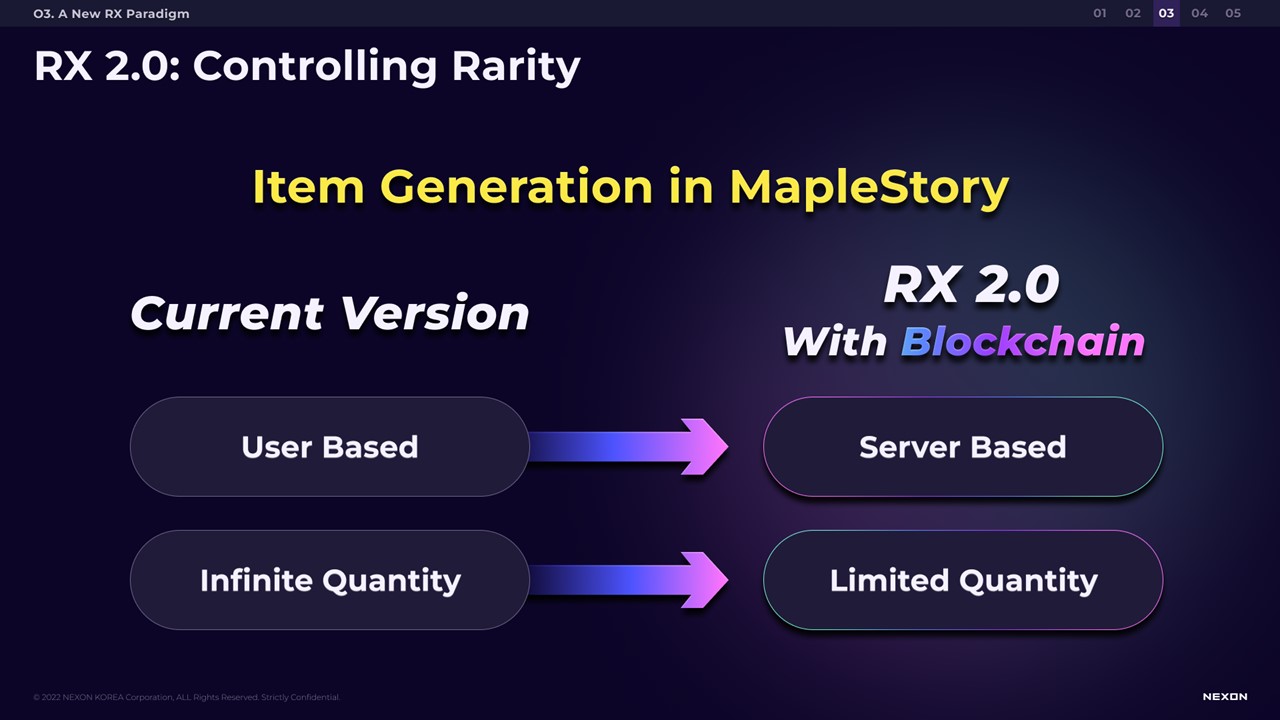
Components of MapleStory Universe: MapleStory N, Worlds, SDK
MapleStory Universe consists of four main components to implement the aforementioned systems: "MapleStory N," "MapleStory N Mobile," "MapleStory N Worlds," and "MapleStory N SDK."
- MapleStory N: A blockchain-based PC MMORPG built on the original IP. It will be the primary content for users in the initial stages of service release. As the quantity of user-generated content (UGC) and modified content (MOD) gradually increases, its role and contribution are expected to decrease over time.
- MapleStory N Mobile: The mobile version of MapleStory N.
- MapleStory N Worlds: This component is a blockchain-based UGC game platform with a user-friendly interface. Its notable feature is the ease of creating content (NFTs and DApps) when using Worlds, making it easily accessible. However, due to the limitations of the provided tools and the freedom of development, its utility is relatively lower compared to the SDK.
- MapleStory N SDK: An API-level development toolkit provided to developers. Creators using the SDK can build various creative DApps and community activities. Compared to Worlds, it offers more diversity and creativity.
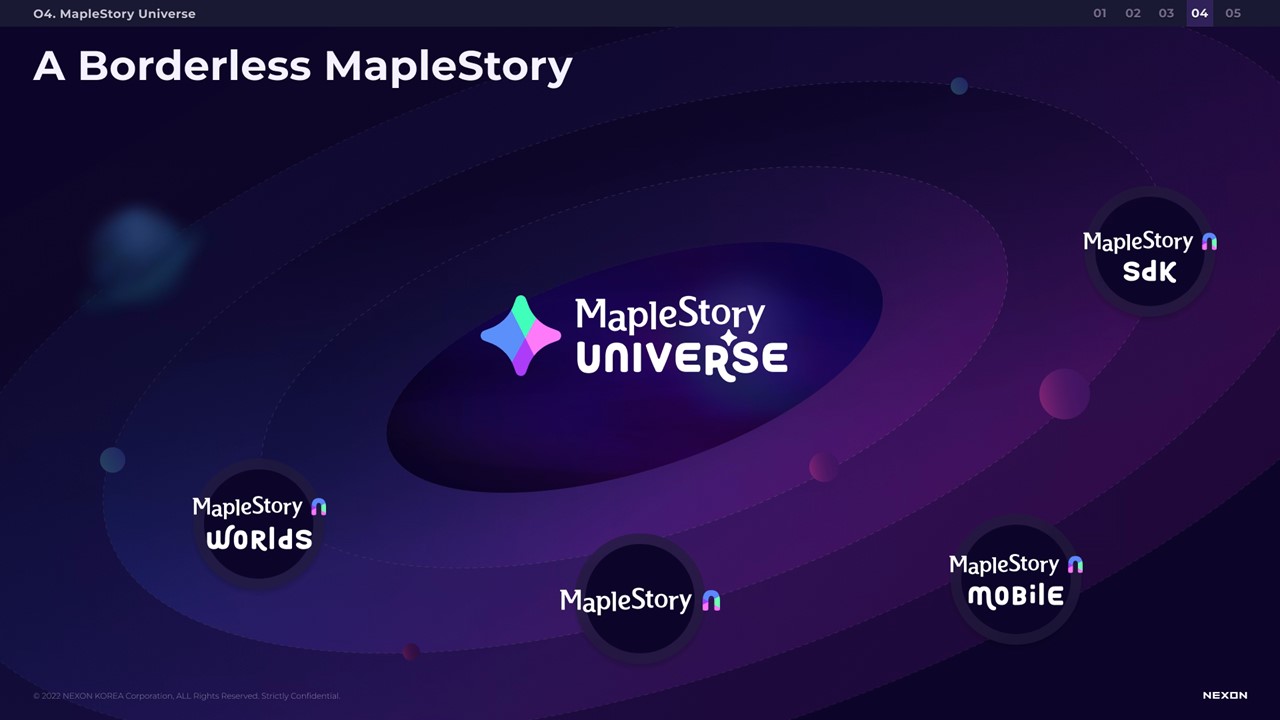
Summary and Reflection
Nexon has discovered the value of blockchain in the P2E field. In pursuit of this, they have developed their own solution and actively promoted the development of MapleStory Universe. To underscore the significance of this initiative, Nexon has elevated the vice president responsible for the project to co-CEO, emphasizing the company's commitment to the joint venture. Given Nexon's track record in embracing open ecosystems, it is reasonable to assume that the company has encountered little resistance in embracing and understanding blockchain concepts.
免责声明:本文章仅代表作者个人观点,不代表本平台的立场和观点。本文章仅供信息分享,不构成对任何人的任何投资建议。用户与作者之间的任何争议,与本平台无关。如网页中刊载的文章或图片涉及侵权,请提供相关的权利证明和身份证明发送邮件到support@aicoin.com,本平台相关工作人员将会进行核查。




